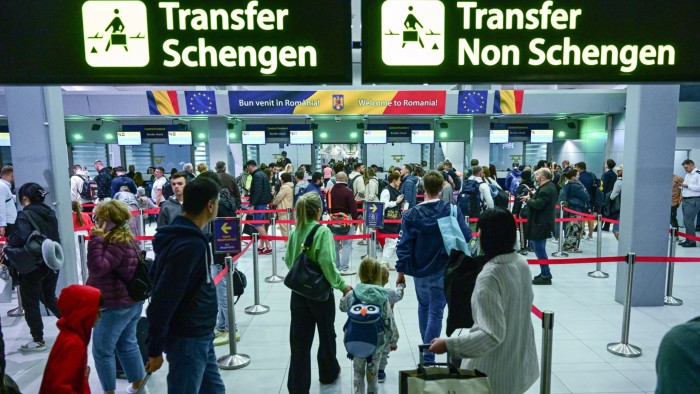Austria set to open way for Bulgaria and Romania to gain full Schengen access

Unlock the Editor’s Digest for free
Roula Khalaf, Editor of the FT, selects her favourite stories in this weekly newsletter.
Austria is expected to drop its veto on Romania and Bulgaria’s full accession to Europe’s Schengen borderless travel zone, paving the way for the two countries to become fully fledged members after more than a decade of disagreement.
The two eastern European nations partially joined Schengen at the end of March this year, allowing the suspension of air and maritime border checks between them and the other 27 countries in the travel area. But controls at land borders remained because of Austria’s veto amid concerns in Vienna over irregular migration.
Vienna is now prepared to lift its prohibition at a meeting of interior ministers from Austria, Romania, Bulgaria and Hungary in Budapest on Friday, according to people familiar with the talks.
The countries’ accession would then need to be formalised, potentially at the next regular meeting of all EU home affairs ministers scheduled for December 12. This would allow all restrictions to be lifted at the start of next year.

Romania and Bulgaria joined the EU in 2007. But their membership of the border-free area was held up due to concerns about corruption and worries that the two countries, which also form part of the EU’s external border, would not do enough to tackle irregular migration.
EU governments agreed to their partial accession to Schengen in March, but Vienna continued to oppose their full membership of the zone — which comprises all EU member states except Ireland and Cyprus, plus Iceland, Norway, Switzerland and Liechtenstein.
The governments in Bucharest and Sofia have increased security at their borders, and asylum applications and arrivals of irregular migrants in the countries have declined. Austria was now happy with the levels, said people familiar with the discussions.
However, despite Austria’s agreement, the Netherlands could still impede the process. The Dutch government gave the green light in 2023 for Bulgaria and Romania to join Schengen, before Geert Wilders’ far-right Freedom party joined the country’s governing coalition following last November’s elections.
Once Austria’s veto is lifted, the Dutch parliament will hold another debate on the issue and could recommend revising the Netherlands’ position.
“Normally the intention would be to stand by the position taken,” one official said, but added that there was a “possibility” MPs in The Hague could change their minds.
Officials briefed on the talks believe that if an agreement is reached at Friday’s meeting, it will send a strong signal to the Netherlands not to change course.
Romania’s Prime Minister Marcel Ciolacu said earlier this week that he was confident of a deal. “We already have an agreed calendar. It will happen from January 1, 2025,” he told local media.
Ciolacu and his Socialists are seen as frontrunners in upcoming elections for the presidency and the parliament. The first round of the presidential vote is scheduled to take place on Sunday, with a possible run-off on December 8.
#Austria #set #open #Bulgaria #Romania #gain #full #Schengen #access





